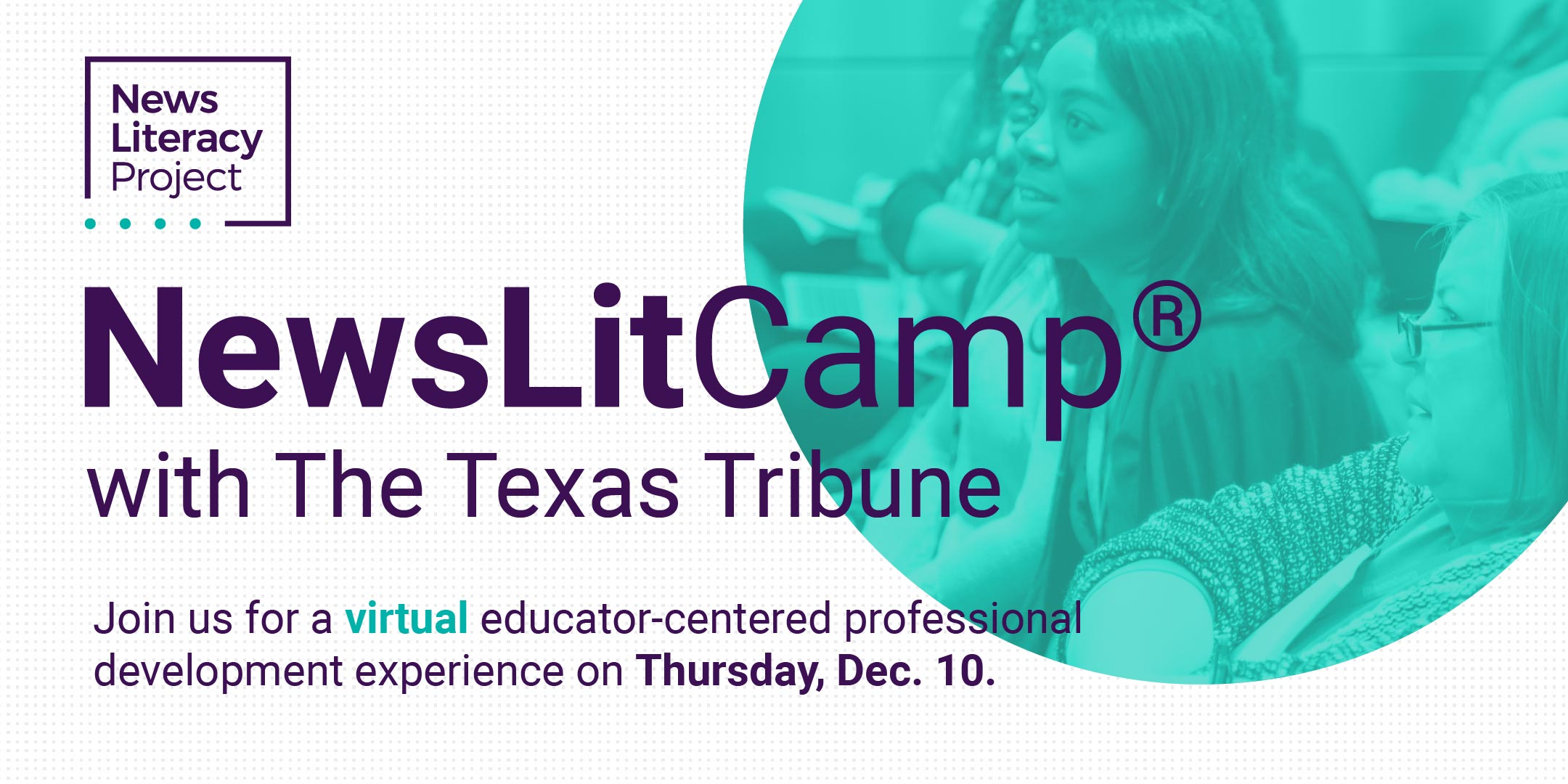edWeb Webinar: “Empowering Students with News Literacy”
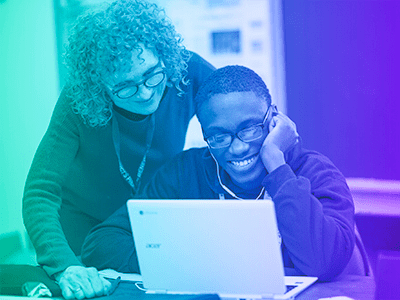
Register here for this free presentation at edWeb.
When students connect strongly to what you are teaching, they become motivated to turn assignments into action. If you want to ignite a spark in your students, you won’t want to miss this edWebinar, featuring the News Literacy Project’s ambassadors. They’ll describe how their students have elevated classroom lessons to the next level. You will learn how to inspire your students as well.
During the session, we will also provide instructional resources for integrating these concepts into your classroom, explain the News Literacy Project’s free educator resources, including Checkology®, and introduce you to NewsLit Nation, our virtual professional learning community (PLC) to connect with and be inspired by other educators across the nation.
This edWebinar will be of interest to teachers, librarians, and school and district leaders of the middle and high school levels. There will be time for questions at the end of the presentation.
NewsLit Week | Twitter chat
 Participate in a live Twitter chat with Ebonee Rice, NLP’s vice president, Educator Network, and several of our NewsLit Nation ambassadors on at #NewsLiteracyWeek.
Participate in a live Twitter chat with Ebonee Rice, NLP’s vice president, Educator Network, and several of our NewsLit Nation ambassadors on at #NewsLiteracyWeek.
Educators, join us to learn more about how to bring news literacy to your classrooms, to feel part of a community and to hear from reporters about how news literacy fits into their jobs.
Open to anyone who wants to connect with NLP, educators and/or journalists.
NewsLit Week | Free “What It Means To Be News Literate” Webinar
NLP is teaming up with Senior Planet to present a webinar titled “What It Means to be News Literate?” The event will serve as an introduction to news literacy for members of the Older Adults Technology Services’ organization and will give their members a better understanding of the basic concepts and skills needed to be well-informed. NLP’s John Silva will share tips on how to recognize the difference between news and opinion, identifying misinformation, evaluating evidence and using fact-checking and digital verification tools to help older adults become more discerning of the different types of information that exist.
The event will take place on Wednesday, January 27 from 1 to 2pm Eastern.
To register, sign up here on Senior Planet’s website.
NewsLit Week | All educators: NewsLitCamp® with CNN Worldwide
About this Event
Join the News Literacy Project (NLP) and CNN Worldwide on Jan. 26 for a national, virtual, teacher-centered NewsLitCamp featuring breakout sessions with CNN television and digital journalists. This program is one in a national series of NewsLitCamps led by the News Literacy Project in collaboration with a diverse group of news organizations around the country.
Sign up here (it’s FREE!) to reserve your seat!
NewsLitCamp is a free professional development experience primarily for middle and high school educators. It features live topical sessions (selected with input from participants) and educator-driven planning time to empower you to teach news literacy. This format gives education professionals an opportunity to come together for a day of conversations with journalists and news literacy experts. Check out our NewsLitCamp video below for a quick look at what the event can offer you.
Details
Join us for a day of free workshops and live interactions with CNN television and digital journalists along with news literacy experts from the News Literacy Project. Register now on Eventbrite (green button); educators will be later be prompted to create a free Sched.com account, which will be the home base for all of the event activities, including access to the Zoom links on the day of the event. Recordings will not be made available, so be sure to save the date!
Sessions will be held from 8:00 a.m.-12:15 p.m. and from 1:30-4:15 p.m. ET; the second session is not a repeat event.
Why attend? As an educator, you directly influence how your students process everything they read, watch and hear. You’ll leave NewsLitCamp with new ideas, skills and resources to help your students navigate today’s complex and challenging information landscape. Our goal is to help teachers and librarians develop expertise in news literacy education, share specialized teaching resources and provide a behind-the-scenes view of the newsgathering process — demystifying what distinguishes quality journalism from rumors, hoaxes and other types of misinformation.
Participating educators will receive a certificate of attendance so they can apply for continuing education credits within their districts.
Who can attend: NewsLitCamp is designed primarily for middle and high school teachers and media specialists. Space permitting, we also will welcome school administrators and post-secondary and international educators. Please email [email protected] with questions.
Bonus Session: You’ll learn about our Checkology® virtual classroom, a free cutting-edge comprehensive e-learning platform that complements educators’ lesson plans. The topics it examines include:
- Misinformation and bias.
- The practice of quality journalism.
- The First Amendment.
- Watchdog journalism and its contributions to democracy.
- Press freedoms around the world.
About CNN Worldwide
This NewsLitCamp is presented by the News Literacy Project and made possible with the generous support of SmartNews.
Top photo: NPR’s Washington Investigative Correspondent Tim Mak with educators at NPR in Washington, D.C., 2019.
Photo Credit: Miriam Romais / The News Literacy Project.
NewsLit Week | edWeb Webinar: “Avoiding the Rabbit Hole: How to Recognize and Understand Conspiratorial Thinking”
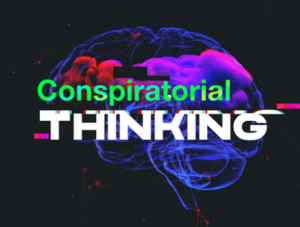 In this virtual edWebinar on Jan. 27, join subject matter expert John Silva and Shaelynn Farnsworth of the News Literacy Project for a conversation about conspiracy theories.
In this virtual edWebinar on Jan. 27, join subject matter expert John Silva and Shaelynn Farnsworth of the News Literacy Project for a conversation about conspiracy theories.
Register here for this free presentation at edWeb.
Conspiracy theories are rampant on social media, particularly related to hyperpartisan political beliefs as well as the COVID-19 pandemic. More importantly, though, the thought processes, cognitive dissonance and biases that lead to beliefs in conspiracy theories are even more common. Most of us engage in some form of conspiratorial thinking regularly, yet somehow don’t fall victim to belief in one or more conspiracy theories. What’s different about people who do?
This edWebinar explores the psychological and cognitive factors behind conspiratorial thinking, including the role of fears and anxiety, cognitive dissonance and biases, motivated reasoning and institutional cynicism. We will discuss the ways conspiracy theories exploit emotions as well as how they fill emotional needs. As part of this session, we will also provide instructional resources for integrating these concepts into your curriculum, including our new, interactive lesson which is part of the Checkology virtual classroom.
This edWebinar will be of interest to teachers, librarians, and school and district leaders of the middle school through higher education levels. There will be time for questions at the end of the presentation.
Illinois educators: NewsLitCamp® with Chicago Defender, ProPublica Illinois, Better Government Association, Rockford Register Star and Block Club Chicago
Join the News Literacy Project (NLP) and Chicago Public School Libraries on Feb. 5 for a virtual teacher-centered NewsLitCamp featuring breakout sessions with journalists from Chicago Defender, ProPublica Illinois, Better Government Association, Rockford Register Star and Block Club Chicago. This program is part of a series of NewsLitCamp events led by the News Literacy Project in collaboration with a diverse group of news organizations around the country.
Sign up today (it’s FREE!) to reserve your seat.
NewsLitCamp is an immersive, free professional development experience primarily for middle and high school educators. It features topical sessions (selected with input from participants) led by Illinois-based journalists and news literacy experts, and educator-driven sessions to empower you to teach news literacy. Check out our NewsLitCamp video for a quick look at what the event can offer you.
Details
Join us for a day of free workshops and interactions with Illinois journalists and experts from the News Literacy Project: 8:30 a.m.-12 p.m. and 1:00-3:45 p.m. CT (9:30 a.m-1 p.m. and 2:00-4:45 p.m. ET / 6:30-10 a.m. and 11:00 a.m.-1:45 p.m. PT).
Educators will be prompted in mid-January to create a Sched.com account, which will be the home base for all of the event activities, including documents and access to the Zoom links.
Why attend? As an educator, you directly influence how your students process everything they read, watch and hear. You’ll leave NewsLitCamp with new ideas, skills and resources to help your students navigate today’s complex and challenging information landscape. Our goal is to help teachers and librarians develop expertise in news literacy education, share specialized teaching resources and provide a behind-the-scenes view of the newsgathering process — demystifying what distinguishes quality journalism from rumors, hoaxes and other types of misinformation.
Educators able to participate for the full day will receive a certificate of attendance to apply for continuing education credits within their districts.
Who can attend: NewsLitCamp is designed primarily for middle and high school teachers and media specialists. Space permitting, we also will welcome school administrators and post-secondary and international educators. Please email [email protected] with questions.
Bonus: You’ll learn about our Checkology® virtual classroom, a free cutting-edge comprehensive e-learning platform that complements educators’ lesson plans. The topics it examines include:
- Misinformation and bias.
- The practice of quality journalism.
- The First Amendment.
- Watchdog journalism and its contributions to democracy.
- Press freedoms around the world.
About the Chicago Defender: The Chicago Defender is multi-media content provider of news, information and events that cover the interests of the urban African American community with culturally relevant content not regularly serviced by mainstream media. Founded in 1905,The Chicago Defender celebrated its 115th Anniversary in 2020 and the evolution being recognized nationally as the 2nd most widely read and best African-American Newspaper by Nielson and Essence Survey 2014.In July 2019, The Chicago Defender transitioned from a printed newspaper into a digitally-focused content platform dedicated to online editorial, premiere events, custom publishing and archival merchandising. Every day, we distribute news and information via multiple platforms. As the voice of the community for more than eleven decades, we take great pride in having access to the grassroots community as well as connections and established relationships with influencers and opinion leaders.
About the Better Government Association: The Better Government Association is a nonpartisan nonprofit news organization and civic advocate working for transparency, efficiency and accountability in government in Chicago and across Illinois.
About Block Club Chicago: Block Club is a nonprofit news organization dedicated to delivering reliable, nonpartisan and essential coverage of Chicago’s diverse neighborhoods. Our full-time reporters are embedded in the communities they cover, allowing them to report with context, respect and with actual knowledge of a neighborhood beyond parachuting in for a “big” story or event. This ground-level approach not only builds community and trust but leads to a more accurate portrayal of a neighborhood.
About ProPublica Illinois: ProPublica Illinois is an independent nonprofit newsroom that produces investigative journalism with moral force. Headquartered in Chicago, we are the first regional publishing operation of ProPublica, dedicated to stories about big issues that affect people living and working in the state of Illinois. ProPublica Illinois was founded in 2017 as a vehicle for leveraging ProPublica’s collaborative model at a regional level, with the goal of making a meaningful difference across the state. With a team of 12 reporters, editors and technologists, we are pursuing stories that hold powerful institutions to account, from politics to government to business.
About the Rockford Register Star: The Rockford Register Star has been northern Illinois’ leading source of news and information for more than 160 years. Owned by Gannett, it was created in 1979 by the merger of the Register Republic founded in 1855, and the Morning Star, founded in 1888.
This NewsLitCamp is presented by the News Literacy Project and is generously supported by the Robert R. McCormick Foundation.
San José educators: NewsLitCamp® with NBC Bay Area
NewsLitCamp helps teachers & librarians develop expertise in news literacy, demystifying what distinguishes quality journalism from misinfo.
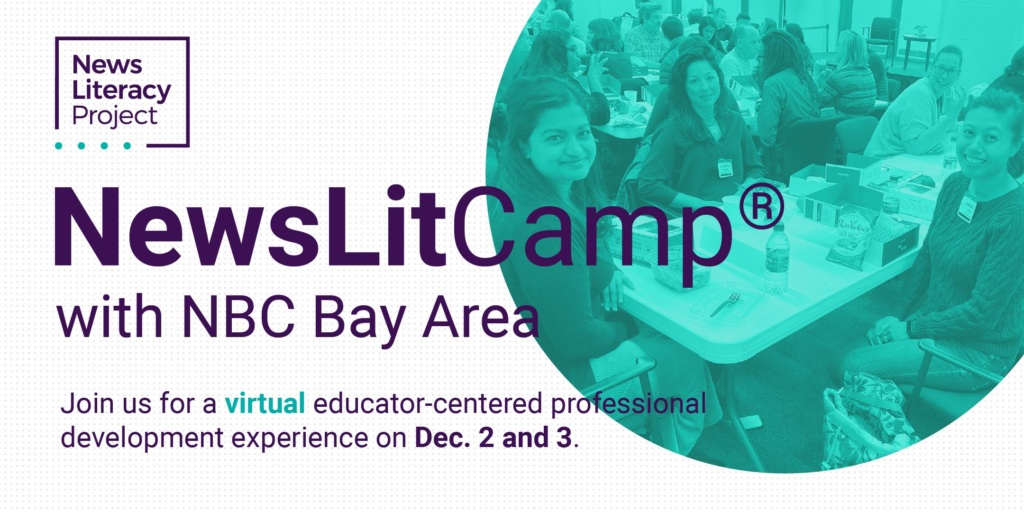
About this Event
Join the News Literacy Project (NLP), the San José Public Library and NBC Bay Area on Dec. 2 and 3 for a virtual, teacher-centered NewsLitCamp featuring breakout sessions with local journalists. This program is part of a series of NewsLitCamp events led by the News Literacy Project in collaboration with a diverse group of news organizations around the country.
Sign up here (it’s FREE!) to reserve your seat!
NewsLitCamp is a free professional development experience primarily for middle and high school educators. It features topical sessions (selected with input from participants) and educator-driven planning time to empower you to teach news literacy. This format gives education professionals an opportunity to come together for a day of conversations with journalists and news literacy experts. Check out our NewsLitCamp video below for a quick look at what the event can offer you.
Details
Join us for several hours of free workshops and interactions with NBC Bay Area anchors, reporters and experts from the News Literacy Project. After registering on Eventbrite, educators will be prompted to create a Sched.com account, which will be the home base for all of the event activities, including access to the Zoom links on the day of the event.
Sessions will be held on Wed. and Thurs. Dec. 2 and 3 from 3-6 p.m. PT.
Why attend? As an educator, you directly influence how your students process everything they read, watch and hear. You’ll leave NewsLitCamp with new ideas, skills and resources to help your students navigate today’s complex and challenging information landscape. Our goal is to help teachers and librarians develop expertise in news literacy education, share specialized teaching resources and provide a behind-the-scenes view of the newsgathering process — demystifying what distinguishes quality journalism from rumors, hoaxes and other types of misinformation.
Participating educators will receive a certificate of attendance so they can apply for continuing education credits within their districts.
Who can attend: NewsLitCamp is designed primarily for middle and high school teachers and media specialists. Space permitting, we also will welcome school administrators and post-secondary and international educators. Please email [email protected] with questions.
Bonus: You’ll learn about our Checkology® virtual classroom, a free cutting-edge comprehensive e-learning platform that complements educators’ lesson plans. The topics it examines include:
- Misinformation and bias.
- The practice of quality journalism.
- The First Amendment.
- Watchdog journalism and its contributions to democracy.
- Press freedoms around the world.
About NBC Bay Area
Owned by NBC Universal, NBC Bay Area/KNTV is the Bay Area’s investigative station located in the heart of Silicon Valley. The station is committed to providing continuous, in-depth journalism with unique personalities. Along with broadcasting NBC’s award-winning daytime, prime-time and late-night programming, NBC Bay Area produces more than 32 hours of news programming each week for television along with continuous news coverage at nbcbayarea.com and multiple other digital platforms.
About SJPL
San José Public Library enriches lives by fostering lifelong learning and by ensuring that every member of the community has access to a vast array of ideas and information.
This NewsLitCamp is presented by the News Literacy Project and is sponsored by the John S. and James L. Knight Foundation.
Top photo: Educators with business reporter Shwanika Narayan at our NewsLitCamp at the San Francisco Chronicle, Nov. 2019. Photo Credit: Miriam Romais / The News Literacy Project.
“Is That A Fact?”: An Analysis of Misinformation and the Election

For a better understanding of how misinformation and disinformation have impacted this election, please join us for a live episode of our podcast Is that a fact? on Wednesday, Nov. 18, at 5:30 p.m. ET. Host Darragh Worland will moderate a lively conversation featuring Enrique Acevedo of 60 in 6 (former anchor at Univision) and an NLP board member, Jane Lytvynenko of BuzzFeed News, and Joan Donovan, research director at Harvard Kennedy School’s Shorenstein Center on Media, Politics and Public Policy.
Register today on Zoom.
All educators: NewsLitCamp® with The Texas Tribune
About this event
NewsLitCamp is now nationwide! Join the News Literacy Project (NLP) and The Texas Tribune on Thursday, Dec. 10, for our first nationwide — and virtual — teacher-centered NewsLitCamp featuring breakout sessions with Texas Tribune journalists. This program is part of a series of NewsLitCamp events led by the News Literacy Project in collaboration with a diverse group of news organizations around the country.
Register here (it’s FREE!) on Eventbrite.
Space is limited. Sign up today to reserve your seat!
NewsLitCamp is a free professional development experience primarily for middle and high school educators. It features topical sessions (selected with input from participants) and educator-driven planning time to empower you to teach news literacy. This format gives education professionals an opportunity to come together for a day of conversations and learning with journalists and news literacy experts.
Details
Educators will convene on Zoom for several hours of free workshops and interactions with Texas Tribune journalists and experts from the News Literacy Project.
Sessions will be held at 8:30-11:45 a.m. and 1:30-3:45 p.m. CT.
Why attend? As an educator, you directly influence how your students process everything they read, watch and hear. You’ll leave NewsLitCamp with new ideas, skills and resources to help your students navigate today’s complex and challenging information landscape. Our goal is to help teachers and librarians develop expertise in news literacy education, share specialized teaching resources and provide a behind-the-scenes view of the news-gathering process — demystifying what distinguishes quality journalism from rumors, hoaxes and other types of misinformation.
Participating educators will receive a certificate of attendance so they can apply for continuing education credits within their districts.
Who can attend: NewsLitCamp is designed primarily for middle and high school teachers and media specialists. Space permitting, we also will welcome school administrators and post-secondary and international educators. Please email [email protected] with questions.
Bonus: You’ll learn about our Checkology® virtual classroom, a cutting-edge comprehensive e-learning platform that complements educators’ lesson plans. Among the topics it covers are:
- Misinformation and bias.
- The practice of quality journalism.
- The First Amendment.
- Watchdog journalism and its contributions to democracy.
- Press freedoms around the world.
About The Texas Tribune
The Texas Tribune is the only member-supported, digital-first, nonpartisan media organization that informs Texans — and engages with them — about public policy, politics, government and statewide issues.
This NewsLitCamp is presented by the News Literacy Project and is sponsored by SmartNews.
Photo: Educators at our NewsLitCamp at Bloomberg News in New York City, Jan. 2020. Photo Credit: Andrea Lin / The News Literacy Project.
edWeb Webinar: “Teaching Disinformation in 2020: CIA Tips for Students and Educators”
In this virtual edWebinar on Oct. 14, join subject matter expert Peter Adams of the News Literacy Project and former CIA officer and author Cindy Otis for a conversation about the difference between misinformation and disinformation.
Register here for this free presentation at edWeb.
Learn how to tell if a bot or a troll is behind the online content you see and what to do about it. Plus, dive into the information landscape surrounding the 2020 elections and political campaigns. Along with highlighting resources, including the award-winning Checkology® virtual classroom, participants will learn strategies for honing news literacy skills using timely, real-world examples. Live attendees will have an opportunity to participate in a book giveaway of True or False by Cindy Otis. Come be a part of creating a “future founded on facts” for your students!
Miami educators: NewsLitCamp® with Univision
Miami-area educators, join the News Literacy Project for a virtual NewsLitCamp® event!
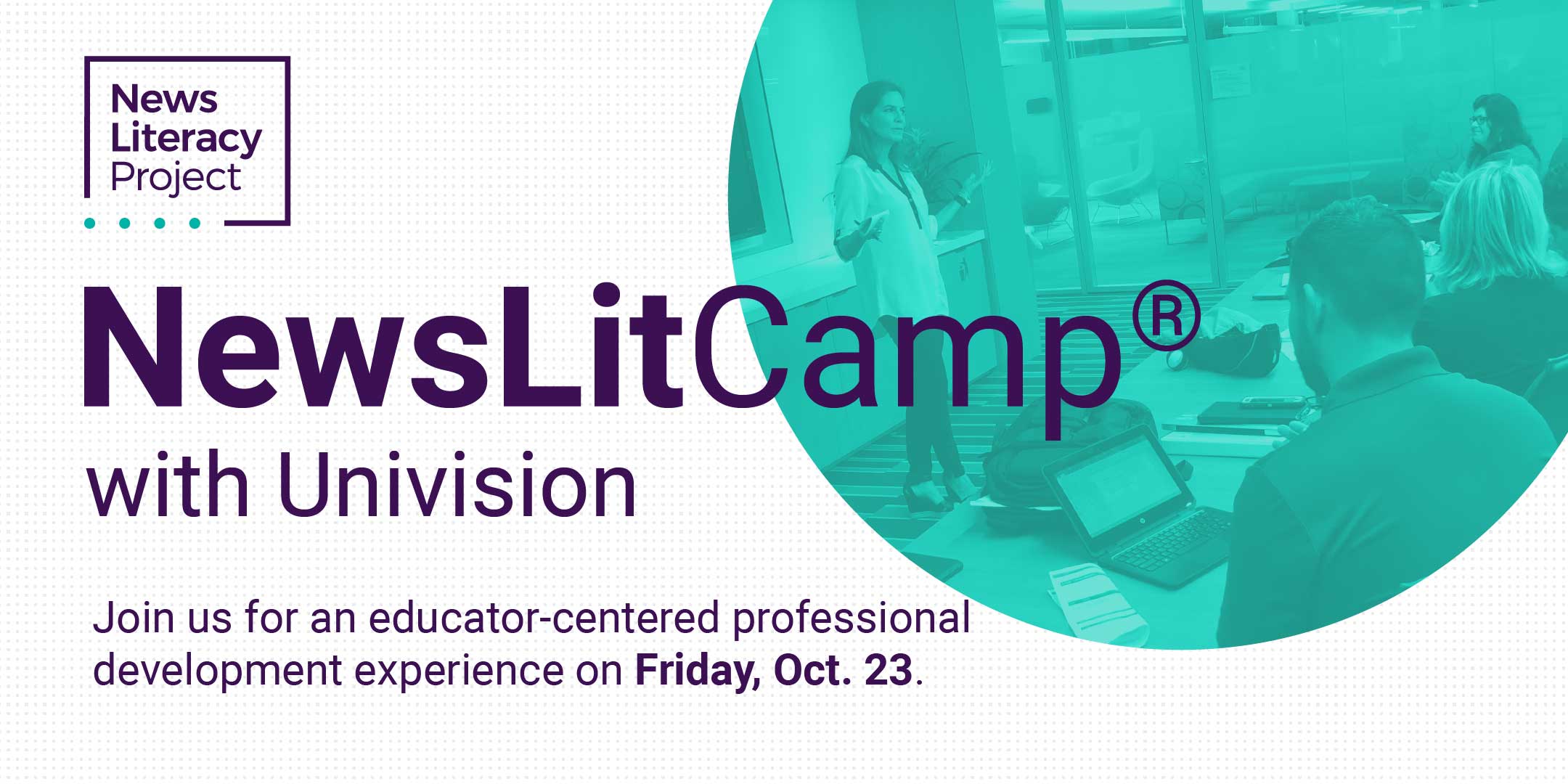
About this Event
Join the News Literacy Project (NLP), Univision News and Miami-Dade County Public Schools on Oct. 23 for a virtual teacher-centered NewsLitCamp featuring breakout sessions with Univision News journalists. This program is one in a national series of NewsLitCamps led by the News Literacy Project in collaboration with a diverse group of news organizations around the country.
Register here (It’s FREE!) on Eventbrite.
Space is limited. Sign up today to reserve your seat!
NewsLitCamp is a free professional development experience primarily for middle and high school educators. It features topical sessions (selected with input from participants) and educator-driven planning time to empower you to teach news literacy. This format gives education professionals an opportunity to come together for a day of conversations with journalists and news literacy experts. Check out our NewsLitCamp video for a quick look at what the day can offer you and your students.
Details
Educators will convene on Zoom for several hours of free workshops and interactions with Univision reporters and editors, and experts from the News Literacy Project.
Sessions will be held at 8:30-11:45 a.m. and 1:30-3:45 p.m. ET.
Why attend? As an educator, you directly influence how your students process everything they read, watch and hear. You’ll leave NewsLitCamp with new ideas, skills and resources to help your students navigate today’s complex and challenging information landscape. Our goal is to develop teachers’ and librarians’ expertise in news literacy education, share specialized teaching resources and provide a behind-the-scenes view of the newsgathering process — demystifying what distinguishes quality journalism from rumors, hoaxes and other types of misinformation.
Miami-Dade County Public School educators: please be sure to utilize your M-DCPS email address when registering in order to receive master plan points.
Who can attend: NewsLitCamp is designed primarily for middle and high school teachers and media specialists. Space permitting, we welcome other educators and school administrators.
Bonus: You’ll learn about our Checkology® virtual classroom, a cutting-edge comprehensive e-learning platform that complements educators’ lesson plans. The topics it examines include:
- Misinformation and bias.
- The practice of quality journalism.
- The First Amendment.
- Watchdog journalism and its contributions to democracy.
- Press freedoms around the world.
About Univision Communications Inc.
Univision is the leading media company serving Hispanic America. The company’s broadcast assets include Univision Network, one of the top television networks in the U.S. regardless of language and the most-watched Spanish-language broadcast network in the country; Univision Local Media, which owns and/or operates 65 television stations and 58 radio stations in major U.S. Hispanic markets and Puerto Rico; and Univision.com, the most-visited Spanish-language website among U.S. Hispanics. The award-winning news division of Univision Communications Inc. is committed to informing the country’s fastest-growing segment across all media platforms. Hispanics count on the latest and most relevant content that impacts the community through Noticiero Univision, the network’s evening, late evening and weekend national newscast; the Sunday public affairs program Al Punto (To The Point); newsmagazine shows Aquí y Ahora (Here and Now) and Primer Impacto (First Impact); as well as morning news segments on Despierta América (Wake Up America). Univision News has strengthened its news team and expanded its operations by adding investigative, documentary, infographics and data journalism units.
This NewsLitCamp is presented by the News Literacy Project and is sponsored by the John S. and James L. Knight Foundation.
Photo: Aquí y Ahora correspondent Tifani Rogers with educators at our NewsLitCamp at Univision in Miami, April 2019. Photo Credit: Miriam Romais / The News Literacy Project.
Lunch and Learn: News Literacy for All

Join us on Oct. 8 for a Lunch and Learn with Peter Adams, NLP’s senior vice president of education.
Register now on Zoom to attend.
Peter will explore recent trends in viral misinformation and how to spot them. He will introduce resources for debunking falsehoods and strategies for talking with friends and family members who share them online.
Misinformation and a lack of news literacy in the United States have created a crisis — an existential threat to our democracy.
That is why the News Literacy Project is thrilled to be expanding our commitment to news literacy education beyond the classroom! This fall, NLP unveiled free tools and resources that are accessible to all, including a customized version of our signature e-learning platform, Checkology®. All of these resources will help the public learn how to identify credible information, seek out reliable sources, understand both media bias as well as their own, and apply critical thinking skills to differentiate fact-based content from falsehoods.
Checkology Office Hours are now open

Sign up to attend on Zoom at this link.
Join us on the last Thursday of each month at 1:30 p.m. PT/ 4:30 p.m. ET to learn more about the News Literacy Project’s Checkology virtual classroom.
Hear about recent platform updates, new resources, and commonly asked user questions. Each webinar will contain a live Q&A at the end to answer your questions!
Fall News Literacy Professional Development Series
Fall News Literacy Series: Skills students must learn to be reliably informed
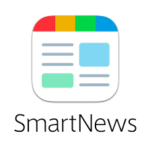
The News Literacy Project is holding a series of four free webinars, addressing essential news literacy topics, every Tuesday in October (Oct. 6, 13, 20, and 27) at 5 p.m. ET/2 p.m. PT. We are allotting 60 minutes for each session, plus an optional 30–minute Q&A to ensure we are able to address all questions. Following each webinar, we will share the recording, as well as additional links and free resources via email. Attendees will also receive a certificate of participation for professional development credit.
Register for the series on Zoom at this link.
This series is generously sponsored by SmartNews.
Session Descriptions
Oct. 6: What it means to be ‘news-literate’: Introduction to news literacy education
We’ll provide an overview of the news literacy skills that students must know to be reliably informed, such as recognizing the difference between news and opinion, identifying misinformation, evaluating evidence, using fact-checking and digital verification tools, and discerning various types and forms of bias.
Here’s the video recording of this session:
Oct. 13: Exploring the misinformation landscape
Learn how to teach students to stop using the phrase “fake news” and to identify the many types of misleading, inaccurate and false information that they regularly encounter. We use examples of misinformation to engage students in news literacy and civic learning, and introduce digital verification tools for debunking manipulated and false images. We also explain the standards of quality journalism, such as fairness, balance and context.
Here’s the video recording of the session:
Oct. 20: Teaching digital verification to spark news literacy learning
Dive into the tools and skills needed to verify the authenticity of information and learn to create engaging fact-checking investigations that inspire students to investigate viral content. Topics include using reverse image searches to determine authenticity; researching domain registration to discover a website’s owner; using archivers to explore deleted or changed content; developing keen observation skills to detect false context; and using Google Street View to confirm locations. Access to News Literacy Project resources and classroom-ready examples is included.
Here’s the recording of the session:
Oct. 27: Understanding bias: A nuanced approach to a vital news literacy topic
Bias is one of the most controversial and important subjects in news literacy. People frequently perceive and allege bias in news coverage, but what does this really mean? What makes a piece of news biased, and who decides? What role do our own biases play in our perceptions of bias? In this session, we’ll help you teach this vital, complex topic in ways that empower students to meaningfully evaluate the fairness and impartiality of news coverage.
Here’s the video recording of this session:
Introducing NLP’s May news literacy webinar series

We recently asked educators what they most wanted us to feature in upcoming professional development webinars. Using that feedback, the News Literacy Project is holding a series of four free webinars, addressing essential news literacy topics, every Thursday in May (May 7, 14, 21 and 28) at 2 p.m. ET/11 a.m. PT.
We are allotting 60 minutes for each session, plus an optional 30 minutes to ensure we are able to address all questions during the Q&A period. Following each webinar, we will share the recording as well as additional links and resources via email.
What it means to be ‘news-literate’: The skills students need to know – May 7th
We’ll provide an overview of the news literacy skills that students must learn to be reliably informed, such as recognizing the difference between news and opinion, identifying misinformation, evaluating evidence, using fact-checking and digital verification tools, and discerning various types and forms of bias. (Note: this is a repeat of the previous webinar on April 7th)
Here’s the video recording of this session:
Exploring the misinformation landscape – May 14th
Learn how to teach students to stop using the phrase “fake news” and to identify the many types of misleading, inaccurate and false information that they encounter every day. We use examples of misinformation to engage students in news literacy and civic learning, and we introduce digital verification skills and tools for debunking manipulated and false images. We also explain the standards of quality journalism, such as fairness, verification, balance and context.
Here’s the video recording of this session:
Teaching digital verification to spark news literacy learning – May 21st
Dive deep into the tools and skills needed to verify the authenticity of information, and learn to create engaging fact-checking investigations that inspire students to investigate viral content. Topics include using reverse image searches to determine authenticity; researching domain registration to discover a website’s owner; using archivers to explore deleted or changed content; developing keen observation skills to detect false context; and using Google Street View to confirm locations. Access to News Literacy Project resources and classroom-ready examples is included.
Here’s the video recording of this session:
Understanding bias: A nuanced approach to a vital news literacy topic – May 28th
Bias is one of the most controversial and important subjects in news literacy. People frequently perceive and allege bias in news coverage — but what does this really mean? What makes a piece of news biased, and who decides? What role do our own biases play in our perceptions of bias? In this session, we’ll help you teach this vital, complex topic in ways that empower students to meaningfully evaluate the fairness and impartiality of news coverage.
Here’s the video recording of this session:
COVID-19 in Context: News Coverage and News Literacy in Uncertain Times
Join the News Literacy Project and the University of Rhode Island’s Metcalf Institute for a four-part webinar series, COVID-19 in Context: News Coverage, News Literacy & Scientific Uncertainty. The series will explore one of the most urgent science communication challenges of our lives through the insights of journalists, news literacy education experts and scientists.
Beginning April 23, we will discuss the experiences of journalists who are covering this evolving pandemic and the challenges of cutting through misinformation — while providing you with the tips and tools to do so, too. We’ll close the series with a discussion about the specific communication challenges posed by all the uncertainties around COVID-19 and how to look for reliable sources to help clarify the unknowns.
You can participate in one or more of the webinars and submit your questions to panelists in the latter part of each session.
The webinars are free; registration is required.
We hope you will join us.
Webinar 1: News Coverage in a Pandemic
April 23, 1 p.m. EDT
COVID-19 represents an unusual challenge for the press. Journalists from small and large outlets and beat and general assignment reporters, they all must cover a rapidly changing story that integrates science, public health, economics, policy, and politics. As newsrooms struggle with understaffing and a lack of experienced science reporters, how are they managing this challenge? In this webinar, speakers will share an overview of COVID-19 news coverage and describe their experiences reporting on this crisis.
Speakers:
- Amy Mitchell, director, journalism research, Pew Research Center
- Apoorva Mandavilli, freelance science journalist contributing to the New York Times
- Jill Jackson, news director, KUOW radio
- Erica Hensley, Investigative Reporter, Mississippi Today
Webinar 2: 10 Critical News Literacy Skills
April 28, 1 p.m. EDT
Being able to tell fact from fiction is critical right now. The coronavirus pandemic has necessitated rapid dissemination of information from many sources, including government officials, the news media and social media. How can you be sure you are getting accurate information? This webinar will identify 10 critical news literacy skills to help you be a smart, active consumer of news and other information.
Speaker: John Silva, director of education, News Literacy Project
Webinar 3: Digital Forensics — How to Fact Check Like a Pro
Digital forensics presentation
April 30, 1 p.m. EDT
Building on the 10 critical news literacy skills of the previous webinar, this presentation will introduce participants to some of the tactics that purveyors of misinformation commonly employ, then demonstrate how to use a variety of free online tools to debunk false content like a pro. Participants will learn how to use critical observation skills, reverse image search engines, lateral reading strategies, web archivers and basic geolocation tools to determine the authenticity, original context and source of viral content.
Speaker: Peter Adams, senior vice president of education, News Literacy Project
Webinar 4: Countering Misinformation in a Crisis: Making Sense of Science during COVID-19
Suzannah Gonzales’ presentation
May 5, 1 p.m. EDT
Because COVID-19 is so new, scientists and medical professionals are still working to answer many basic questions about its spread and treatment. Even as the research advances every day, the scientific uncertainties and unclear communication make it easy to spread misinformation. Information about COVID-19 is spreading so quickly that some have described this as an “infodemic.” Webinar speakers will discuss how to understand these uncertainties and actively counter misinformation.
Speakers:
- Suzannah Gonzales, associate director of education, News Literacy Project
- Brandon Ogbunu, assistant professor, Brown University
- Leysia Palen, professor of computer science and professor and founding chair of the Department of Information Science, University of Colorado
![]()
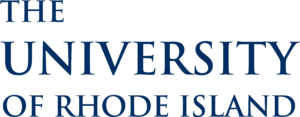
About the Metcalf Institute
The University of Rhode Island’s Metcalf Institute provides education, training and resources for journalists, researchers, and other science communicators to engage diverse audiences in conversations about science and the environment. Metcalf Institute was established at the University of Rhode Island in 1997 with funding from three media foundations: the Belo Corporation, the Providence Journal Charitable Foundation and the Philip L. Graham Fund, with additional support from the Telaka Foundation.
NLP webinar: What does it mean to be ‘news-literate’?
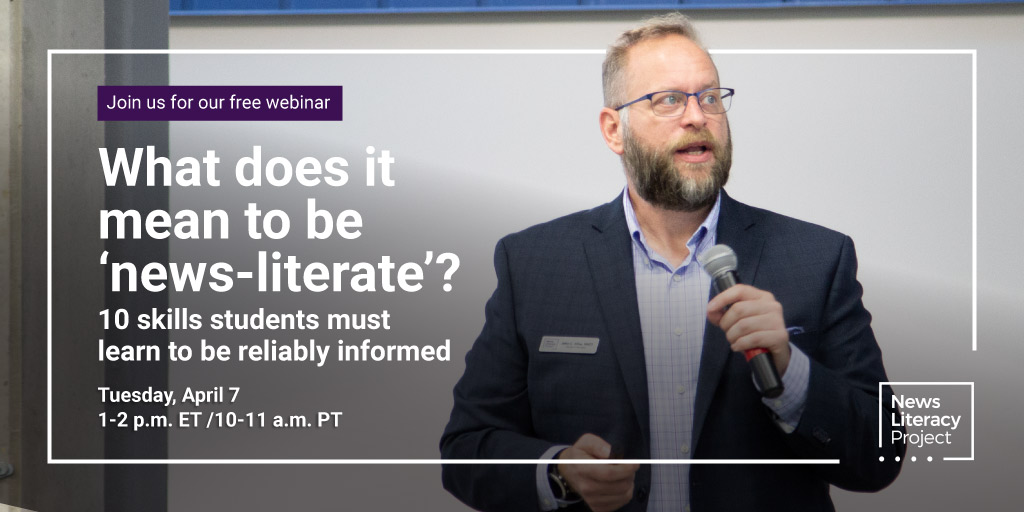
Educators and parents: If school closures mean that you’re teaching students through distance learning or homeschooling, join NLP for a one-hour webinar on Tuesday, April 7, starting at 1 p.m ET / 10 a.m. PT.
The ability to sort fact from fiction — to identify reliable sources of information and recognize misinformation — has taken on new significance as we grapple with the COVID-19 pandemic and the torrent of misinformation that has arisen about it. News literacy skills empower students to successfully traverse today’s challenging and complex information landscape.
Register now (it’s free!): bit.ly/10skillswebinar
This webinar features 10 key news literacy skills that students need to know to become reliably informed, such as identifying misinformation, applying fact-checking and digital verification skills and tools, recognizing the standards of quality journalism, and building a healthy “news diet” from a variety of credible media sources.
Whatever your experience in teaching news literacy, you’ll be inspired by this webinar, which provides clear learning objectives and resources for integrating these skills and tools into curricula across subject areas and grade levels. We will share relevant, real-world examples and provide FREE Premium student licenses for NLP’s Checkology® virtual classroom — which is uniquely suited for remote learning — that are valid through June 30. (U.S. educators/parents only).
Photo caption: NLP’s John Silva, NBCT, with educators at our NewsLitCamp® at Richland Two Institute of Innovation in Columbia, SC, January 17, 2020. (Andrea Lin / The News Literacy Project)
POSTPONED: Detroit educators: NewsLitCamp® with WXYZ-TV Channel 7 and the Detroit Free Press
This event has been postponed indefinitely due to the Coronavirus (COVID-19) pandemic. Please check back later for information on a new date.
Join the News Literacy Project, WXYZ-TV Channel 7, the Detroit Free Press and Detroit Public Schools Community District for a highly engaging, educator-centered NewsLitCamp featuring breakout sessions with local journalists.
Registration details coming soon!
NewsLitCamp is a day-long professional development experience based on an “edcamp” style of continuing education. It features topical sessions (selected with input from participants) and educator-driven planning and development time to empower you to teach news literacy. This format gives education professionals an opportunity to come together for a day of conversations with journalists and news literacy experts.
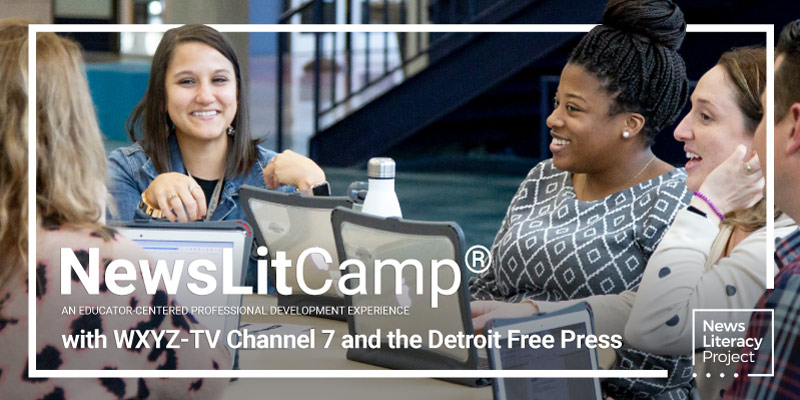
Details
Educators will meet at WXYZ-TV Channel 7 on Saturday, May 16, for a full day of free workshops and interactions with experts from the News Literacy Project and journalists from WXYZ-TV Channel 7 and the Detroit Free Press. WXYZ-TV Channel 7 is located at 20777 West 10 Mile Road, Southfield, MI 48075.
Breakfast and networking begin at 8 a.m.; NewsLitCamp starts promptly at 8:30 a.m. Lunch will be provided.
Why attend?
As an educator, you directly influence how your students process what they read, watch and hear. At the end of our NewsLitCamp, you’ll leave with new ideas, skills and resources to help your students navigate today’s complex information landscape and beat back a rising tide of misinformation. Our goal is to develop teachers’ and librarians’ expertise in news literacy education, share specialized teaching resources and provide a behind-the-scenes view of the news reporting process. These sessions aim to demystify and explain what distinguishes quality journalism.
Check out our NewsLitCamp video for a quick look at what the day can offer you and your students.
Who can attend
NewsLitCamps are designed primarily for middle school and high school teachers and media specialists. Space permitting, we welcome other educators and school administrators.
Bonus: You’ll learn about our Checkology® virtual classroom, a cutting-edge comprehensive news literacy e-learning platform that complements educators’ lesson plans. The topics it examines include:
- Misinformation.
- Bias.
- The practice of quality journalism.
- The First Amendment.
- Watchdog journalism and its contributions to democracy.
- Press freedoms around the world.
This NewsLitCamp is presented by the News Literacy Project and is supported by the John S. and James L. Knight Foundation with additional promotional support offered by the Michigan State University School of Journalism.
Photo Caption: Educators at our NewsLitCamp in Columbia, South Carolina, January 2020.
Photo Credit: Andrea Lin/News Literacy Project.
POSTPONED: Chicago educators: NewsLitCamp® with Block Club Chicago, The Better Government Association, The Chicago Reporter and ProPublica Illinois
This event has been postponed indefinitely due to the Coronavirus (COVID-19) pandemic. Please check back later for information on a new date.
Join the News Literacy Project, Block Club Chicago, the Better Government Association, The Chicago Reporter, ProPublica Illinois and Chicago Public Schools, for a highly engaging, teacher-centered NewsLitCamp featuring breakout sessions with local journalists.
Register today at this link (it’s FREE!) to reserve your seat: http://bit.ly/ChicagoNLC20.
Space is limited. Sign up today to reserve your seat!
NewsLitCamp is a day-long professional development experience based on an “edcamp” style of continuing education. It features topical sessions (selected with input from participants) and educator-driven planning and development time to empower you to teach news literacy. This format gives education professionals an opportunity to come together for a day of conversations with journalists and news literacy experts.
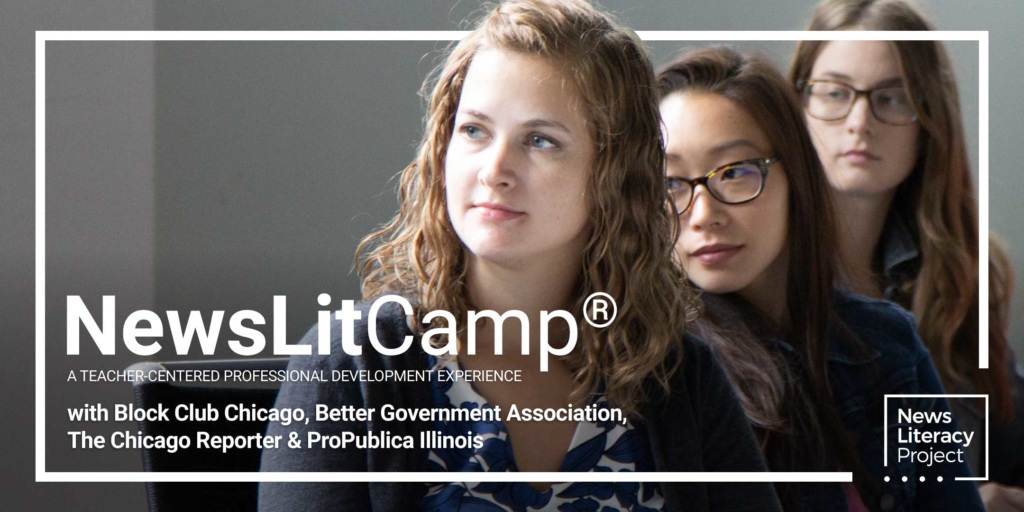
Details
Educators will meet at the Chicago Literacy Alliance on Friday, Apr. 17, for a full day of free workshops and interactions with experts from the News Literacy Project and journalists from Block Club Chicago, The Chicago Reporter, the Better Government Association (BGA) and ProPublica Illinois.
Breakfast and networking begin at 8 a.m.; NewsLitCamp starts promptly at 8:30 a.m. Lunch will be provided. The Chicago Literacy Alliance is located at 641 W. Lake St. in Chicago.
Why attend?
As an educator, you directly influence how your students process what they read, watch and hear. At the end of our NewsLitCamp, you’ll leave with new ideas, skills and resources to help your students navigate today’s complex information landscape and beat back a rising tide of misinformation. Our goal is to develop teachers’ and librarians’ expertise in news literacy education, share specialized teaching resources and provide a behind-the-scenes view of the news reporting process. These sessions aim to demystify and explain what distinguishes quality journalism.
Check out our NewsLitCamp video for a quick look at what the day can offer you and your students.
Who can attend
NewsLitCamps are designed primarily for middle school and high school teachers and media specialists. Space permitting, we welcome other educators and school administrators. Chicago Public Schools educators can receive CPDUs if they register via the Learning Hub in addition to Eventbrite (code provided after registration); participants from other schools may apply for credit within their districts.
Bonus: You’ll learn about our Checkology® virtual classroom, a cutting-edge comprehensive news literacy e-learning platform that complements educators’ lesson plans. The topics it examines include:
- Misinformation.
- Bias.
- The practice of quality journalism.
- The First Amendment.
- Watchdog journalism and its contributions to democracy.
- Press freedoms around the world.
About The Chicago Reporter
Founded on the heels of the civil rights movement of the 1960s, The Chicago Reporter confronts racial and economic inequality, using the power of investigative journalism. Our mission is national but grounded in Chicago, one of the most segregated cities in the nation and a bellwether for urban policies.
About Block Club Chicago
Block Club is a nonprofit news organization dedicated to delivering reliable, nonpartisan and essential coverage of Chicago’s diverse neighborhoods. Our reporters don’t parachute in once to cover a story; they are in the neighborhoods they cover every day, building relationships and amplifying positive stories. We believe this ground-level approach not only builds community but also leads to a more accurate portrayal of a neighborhood.
About the Better Government Association
The Better Government Association is a nonpartisan nonprofit news organization and civic advocate working for transparency, efficiency and accountability in government in Chicago and across Illinois.
About ProPublica Illinois
ProPublica Illinois is an independent nonprofit newsroom that produces investigative journalism with moral force. Headquartered in Chicago, we are the first regional publishing operation of ProPublica, dedicated to stories about big issues that affect people living and working in the state of Illinois. ProPublica Illinois was founded in 2017 as a vehicle for leveraging ProPublica’s collaborative model at a regional level, with the goal of making a meaningful difference across the state. With a team of 12 reporters, editors and technologists, we are pursuing stories that hold powerful institutions to account, from politics to government to business.
About the Chicago Literacy Alliance
CLA is an association of more than 120 organizations (including NLP’s education team) that work across disciplines, age groups, education levels, and neighborhoods across Chicago to create crucial literacy services and educational programs that improve lives. The alliance provides work and meeting space and offers professional development and programming tailor-made to increase capacity, foster collaboration, and ultimately, expand the impact of these organizations.
This NewsLitCamp is presented by the News Literacy Project and is supported by the Robert R. McCormick Foundation.
Photo Caption: Educators at our NewsLitCamp at NPR in Washington, D.C., August 2019. Photo Credit: Andrea Lin/The News Literacy Project.
Illinois educators: NewsLitCamp® with the Rockford Register Star
Join the News Literacy Project, the Rockford Register Star and Rockford Public Schools (RPS) on Tuesday, Feb. 11, for a highly engaging, teacher-centered NewsLitCamp featuring breakout sessions with local journalists. This program is one in a national series of NewsLitCamps led by the News Literacy Project in collaboration with a diverse group of news organizations around the country.
Register today at this link (it’s FREE!) to reserve your seat: http://bit.ly/newslitcampRockford.
Space is limited. Sign up today to reserve your seat!
NewsLitCamp is a day-long professional development experience based on an “edcamp” style of continuing education. It features topical sessions (selected with input from participants) and educator-driven planning time to empower you to teachnews literacy. This format gives education professionals an opportunity to come together for a day of conversations with journalists and news literacy experts. Check out our NewsLitCamp video for a quick look at what the day can offer you and your students.
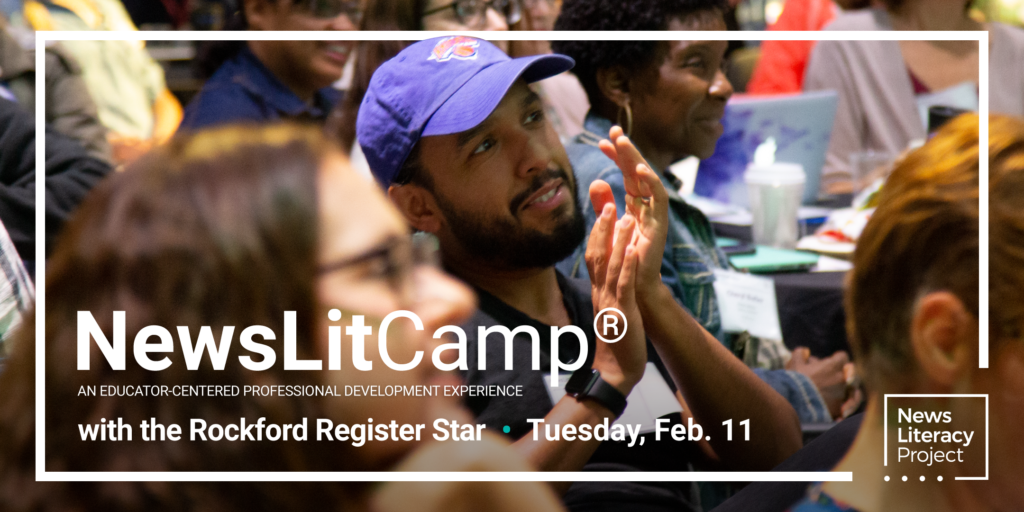
Details
Educators will meet at the Rockford Register Star, 99 E. State St., on Tuesday, Feb. 11, for a full day of free workshops and interactions with their journalists and experts from the News Literacy Project.
Breakfast and networking begin at 8 a.m.; NewsLitCamp starts promptly at 8:30 a.m. Lunch will be provided.
Why attend?
As an educator, you directly influence how your students process everything they read, watch and hear. You’ll leave NewsLitCamp with new ideas, skills and resources to help your students navigate today’s complex and challenging information landscape. Our goal is to develop teachers’ and librarians’ expertise in news literacy education, share specialized teaching resources and provide a behind-the-scenes view of the newsgathering process — demystifying what distinguishes quality journalism from rumors, hoaxes and other types of misinformation.
RPS educators following the required registration protocol will receive 6 PDCs for successful completion; participants from other schools can apply for credit within their districts.
Who can attend
NewsLitCamps are designed primarily for middle school and high school teachers and media specialists. Space permitting, we welcome other educators and school administrators.
Bonus: You’ll learn about our Checkology® virtual classroom, a cutting-edge comprehensive e-learning platform that complements educators’ lesson plans. The topics it examines include:
- Misinformation.
- The practice of quality journalism.
- The First Amendment.
- Watchdog journalism and its contributions to democracy.
- Press freedoms around the world.
About the Rockford Register Star
The Rockford Register Star has been northern Illinois’ leading source of news and information for more than 160 years. Owned by Gannett, it was created in 1979 by the merger of the Register Republic founded in 1855, and the Morning Star, founded in 1888.
This NewsLitCamp is presented by the News Literacy Project and is supported by the Robert R. McCormick Foundation.
Photo Caption: Educators at our NewsLitCamp at NPR in Washington, August 2019. Photo Credit: Andrea Lin / The News Literacy Project.
Akron educators: NewsLitCamp® with the Akron Beacon Journal & Greater Akron Chamber
Join the News Literacy Project, the Akron Beacon Journal and the Six District Educational Compact on Thursday, Jan. 30, for a highly engaging, teacher-centered NewsLitCamp featuring breakout sessions with local journalists.
Register today at this link (it’s FREE!) to reserve your seat: http://bit.ly/newslitcampAkron.
Space is limited. Sign up today to reserve your seat!
NewsLitCamp is a day-long professional development experience based on an “edcamp” style of continuing education. It features topical sessions (selected with input from participants) and educator-driven planning time to empower you to teach news literacy. This format gives education professionals an opportunity to come together for a day of conversations with journalists and news literacy experts.
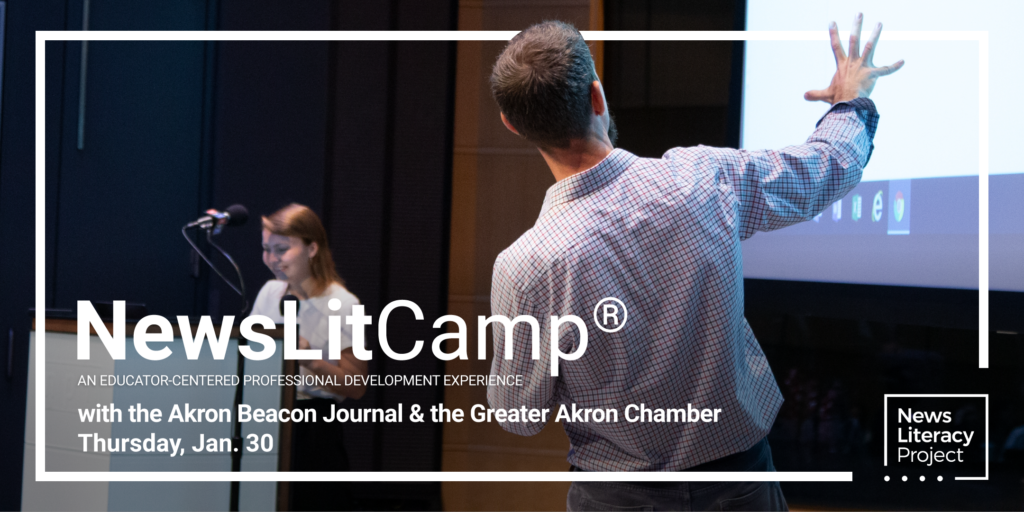
Details
Educators will meet at the Greater Akron Chamber, 388 S. Main St., on Thursday, Jan. 30, for a full day of free workshops and interactions with experts from the News Literacy Project and journalists from the Akron Beacon Journal (which is located in the same building).
Registration and networking will begin at 9:30 a.m.; NewsLitCamp starts promptly at 10 a.m. Lunch will be provided.
Why attend?
As an educator, you directly influence how your students process everything they read, watch and hear. You’ll leave NewsLitCamp with new ideas, skills and resources to help your students navigate today’s complex and challenging information landscape. Our goal is to develop teachers’ and librarians’ expertise in news literacy education, share specialized teaching resources and provide a behind-the-scenes view of the newsgathering process — demystifying what distinguishes quality journalism from rumors, hoaxes and other types of misinformation.
Check out our NewsLitCamp video for a quick look at what the day can offer you and your students.
Participating educators will receive a certificate of completion and may apply for professional development credit within their districts.
Who can attend
NewsLitCamps are designed primarily for middle school and high school teachers and media specialists. Space permitting, we welcome other educators and school administrators.
Bonus: You’ll learn about our Checkology® virtual classroom, a cutting-edge comprehensive e-learning platform that complements educators’ lesson plans. The topics it examines include:
- Misinformation.
- The practice of quality journalism.
- The First Amendment.
- Watchdog journalism and its contributions to democracy.
- Press freedoms around the world.
About the Akron Beacon Journal
A trusted news source since 1839, the Akron Beacon Journal is the largest news-gathering operation in Summit County and is known for its in-depth local reporting. The newspaper and website (BeaconJournal.com) regularly attract accolades from professional journalism associations at the local, regional, state and national levels. The Beacon Journal has received four Pulitzer Prizes, the highest honor in journalism.
This NewsLitCamp is presented by the News Literacy Project and is supported by the John S. and James L. Knight Foundation
Photo Caption: Senior editor of education Cory Turner and production assistant Clare Lombardo leading a session with educators at our NewsLitCamp at NPR in Washington, August 2019. Photo Credit: Andrea Lin / The News Literacy Project.
NYC Educators: NewsLitCamp® with Bloomberg News
Join the News Literacy Project for a NewsLitCamp® in New York City!
Join the News Literacy Project, the New York City Department of Education and Bloomberg News on Monday, Jan. 27, for a highly engaging, teacher-centered NewsLitCamp featuring breakout sessions with experienced journalists. This program is one in a national series of NewsLitCamps led by the News Literacy Project in collaboration with a diverse group of news organizations around the country.
Register today at this link (it’s FREE!) to reserve your seat: http://bit.ly/NYCnewslitcamp.
NewsLitCamp is a day-long professional development experience based on an “edcamp” style of continuing education. It features topical sessions (selected with input from participants) and educator-driven planning time to empower you to teach news literacy. This format gives education professionals an opportunity to come together for a day of conversations with journalists and news literacy experts.
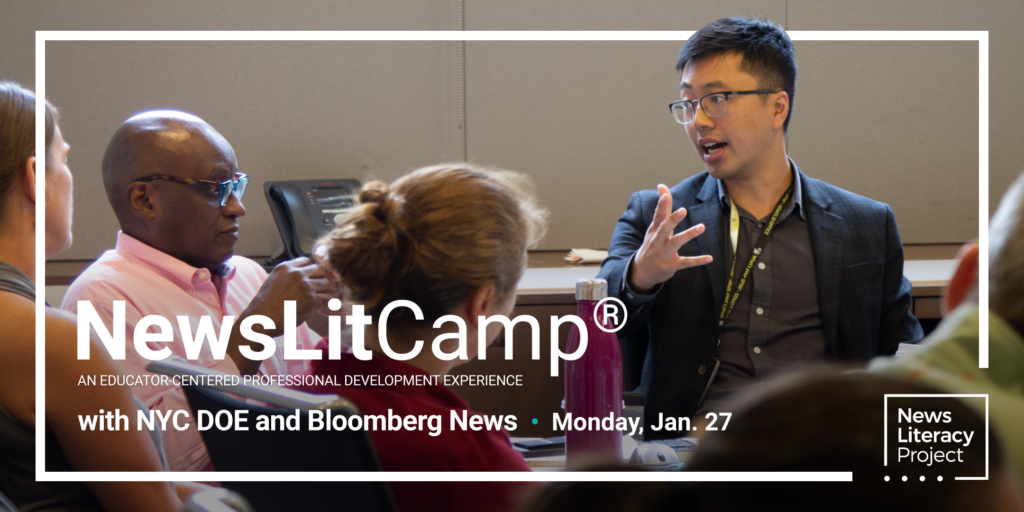
Details
Educators will meet at Bloomberg, 731 Lexington Ave., on Monday, Jan. 27, for a full day of free workshops and interactions with experts from the News Literacy Project and journalists from Bloomberg News.
Breakfast and networking begin at 8 a.m.; NewsLitCamp starts promptly at 8:30 a.m. Lunch will be provided.
Why attend?
As an educator, you directly influence how your students process everything they read, watch and hear. You’ll leave NewsLitCamp with new ideas, skills and resources to help your students navigate today’s complex information landscape. Our goal is to develop teachers’ and librarians’ expertise in news literacy education, share specialized teaching resources and provide a behind-the-scenes view of the news-gathering process. These sessions aim to demystify and explain what distinguishes quality journalism. Check out our NewsLitCamp video for a quick look at what the day can offer you and your students.
NYCDOE participants can receive up to seven hours of CTLE credit (you must sign up with your DOE email: schools.nyc.gov). Participants from other schools can apply for credit within their districts.
Who can attend
NewsLitCamps are designed primarily for middle school and high school teachers and media specialists. Space permitting, we welcome other educators and school administrators.
Bonus: You’ll learn about our Checkology® virtual classroom, a cutting-edge comprehensive e-learning platform that complements educators’ lesson plans. The topics it examines include:
- Misinformation.
- Bias.
- The standards of quality journalism.
- The First Amendment.
- Watchdog journalism and its contributions to democracy.
- Press freedoms around the world.
About Bloomberg News
Bloomberg News, a division of Bloomberg LP, is an international news agency headquartered in New York. Its reporting is disseminated through the Bloomberg Terminal, Bloomberg Television, Bloomberg Radio, Bloomberg Businessweek, Bloomberg Markets, Bloomberg.com and Bloomberg’s mobile platforms. Using the power of technology, Bloomberg connects the world’s decision-makers to accurate information on the financial markets — and helps them make faster, smarter decisions.
This NewsLitCamp is presented by the News Literacy Project in partnership with Bloomberg News.
Photo Caption: Reporter Tim Mak and deputy managing editor Terence Samuel leading a session with educators at our NewsLitCamp at NPR in Washington, August 2019. Photo Credit: Andrea Lin / The News Literacy Project.
Columbia educators: NewsLitCamp® with South Carolina Educational Television and Public Radio
Join the News Literacy Project (NLP), South Carolina ETV and Public Radio, and Richland School District Two for a highly engaging (and free!) one-day NewsLitCamp, featuring breakout sessions with journalists. RSD2 educators can receive up to 7 renewal credits; other educators can apply for credit from their districts.
Register today at this link (it’s FREE!) to reserve your seat: http://bit.ly/ColumbiaNLC. Space is limited.
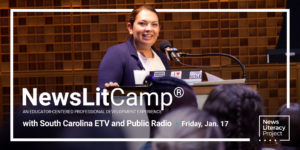
Details
Educators will meet at the Richland Two Institute of Innovation (R2I2), 763 Fashion Drive, on Friday, Jan. 17, for a full day of free workshops and interactions with experts from the News Literacy Project and journalists from South Carolina ETV and Public Radio.
Breakfast and networking begin at 8 a.m.; NewsLitCamp starts promptly at 8:30 a.m. Lunch will be provided.
Why attend?
As an educator, you directly influence how your students process what they’re reading, watching and hearing. You’ll leave NewsLitCamp with new ideas, skills and resources to help your students navigate today’s complex and challenging information landscape. Our goal is to develop teachers’ and librarians’ expertise in news literacy education, share specialized teaching resources and provide a behind-the-scenes look at the newsgathering process. These sessions (selected with input from participants) aim to demystify that process and explain what goes into the creation and production of quality standards-based journalism. Check out our NewsLitCamp video for a quick look at what the day can offer you and your students.
Richland Two educators can receive up to 7 renewal credits for participation; educators from outside RSD2 can apply to their districts for credit.
Who can attend
NewsLitCamps are designed primarily for middle school and high school teachers and media specialists. Space permitting, we welcome other educators and school administrators.
Bonus: You’ll learn about our Checkology® virtual classroom, a cutting-edge comprehensive e-learning platform that complements educators’ lesson plans. The topics it examines include:
- Misinformation.
- Bias.
- The practice of quality journalism.
- The First Amendment.
- Watchdog journalism and its contributions to democracy.
- Press freedoms around the world.
About South Carolina ETV and Public Radio
As the state’s public educational broadcasting network, South Carolina ETV and Public Radio uses television, radio and the internet to enrich lives by educating children, informing and connecting citizens, celebrating our culture and environment, and instilling the joy of learning. It provides national and local content to classrooms via internet services Knowitall.org, LearningWhy and PBS Learning Media, along withteacher training and recertification in face-to-face and online settings. SCETV and Public Radio began in 1958 with closed-circuit broadcasts to multiple schools of French and plane geometry classes at Dreher High School in Columbia. Today the network comprises 11 TV stations, eight radio stations and a statewide tower network that serves schools, hospitals and emergency management teams.
This NewsLitCamp is presented by the News Literacy Project and is supported by the John S. and James L. Knight Foundation
Photo Caption: Welcoming remarks by K. Hirsch, social studies supervisor, Arlington Public Schools, at our NewsLitCamp at NPR in Washington, August 2018. Photo Credit: Andrea Lin / The News Literacy Project
CNN’s Camerota and Cooper talk journalism, news literacy with NLP
Anchors and executives at CNN welcomed supporters of the News Literacy Project to the network’s new headquarters in New York City’s Hudson Yards on Oct. 22 for a discussion about quality journalism and the importance of news literacy at a time when facts are competing for attention with overwhelming (and growing) amounts of “fake.”
Alisyn Camerota, the co-host of New Day, and Anderson Cooper, the anchor of Anderson Cooper 360°, led the discussion. Joining them were Poppy Harlow, anchor of CNN Newsroom; New Day co-host John Berman and executive producer Javier Morgado; Richard Davis, the network’s executive vice president of news standards and practices; and Alan Miller, the News Literacy Project’s founder and CEO.
Need for news literacy
Cooper and Camerota shared their insights into the speed of the news cycle, the challenges of providing balanced coverage in a highly partisan era, the methods they use to handle guests who stray from the facts, and ultimately, the growing need for news literacy.
“I don’t think people have understood that reporters during World War II were censored in terms of what they could report,” Cooper said. He noted that “there’s been an evolution of what reporters do and the role of reporters. But I do think getting that across to a new generation of people who are growing up watching this stuff by themselves and watching Infowars with as much curiosity and belief as something else — that’s alarming.”
Understanding ‘the rules of journalism’
Camerota, who is also a member of NLP’s National Leadership Council, concurred: “I don’t think that most news consumers know the rules of journalism,” she said, adding: “People think we are anti-government or anti-president or anti-something, not knowing that we’re the people who are tasked with pointing out hypocrisy and pointing out discrepancies.”
Today, she said, “news consumers now go to their corners and they go to wherever they get confirmation bias. … Part of why the News Literacy Project appeals to me so much is that it breaks down where you actually look for facts, it breaks down how you can tell if a photo has been Photoshopped, and it breaks down what you need to look for in a byline.”
Educators: Sign up for our online professional development series
Is one of your goals as a teacher to help your students make sense of the torrent of news and other information streaming through their online worlds?
Would you like to empower your students by providing them with the news literacy skills they need to become active and engaged participants in civic life?
Our new professional development sessions are for you!
“Teaching News Literacy” is an affordable series of five online workshops that meet these needs. It’s offered by the News Literacy Project, the nation’s leading provider of news literacy training and resources for middle school and high school educators.
Led by Peter Adams, NLP’s senior vice president of education, John Silva, a National Board Certified Teacher and director of education and Suzannah Gonzales, a former journalist and associate director of education, these workshops will give you everything you need to begin introducing news literacy into your classroom, including dozens of ideas, examples and tools to jump-start your news literacy instruction.
You can register for one, some or all of the sessions here ($10 per session/$40 for all five).
Session Descriptions
Session 1 – Introducing news literacy education: This session uses timely events and examples to make the case for news literacy as a vital 21st-century life skill; it also provides an overview of the field’s major concepts, skills and tools. You’ll learn how today’s information landscape is evolving in ways that create both challenges and opportunities for students, and how to use these shifts in the landscape to teach news literacy i n your classroom. We’ll cover the changing nature of advertising, the impact of algorithms, the roles of bots and other forms of computational propaganda, and more. Tuesday, Sept. 24 (5 to 6 p.m. ET)
Session 2 – Exploring the misinformation landscape: Dive into the world of viral rumors, disinformation, hoaxes and fakes — and learn how to help students push beyond the term “fake news” to identify the many types of misleading, inaccurate and false information that they encounter every day. Find out how to prepare your students for emerging misinformation technologies such as d eepfake videos and other AI-generated content. We’ll also show you how to use examples of misinformation to engage students in news literacy and civic learning, spark meaningful discussions about current events and issues, and develop an internal system of red flags that students can use to join the fight against the spread of misinformation. Tuesday, Oct. 1 (5 to 6 p.m. ET)
Session 3 – Teaching digital verification to spark news literacy learning:Teach students the tools and skills that professional fact-checkers use to verify the authenticity of information, and learn to create engaging challenges that inspire students to investigate viral content (including political misinformation). Learn how to teach students to do reverse image searches; research domain registration to discover a website’s owner; use web archivers to explore deleted or changed content; develop keen observation skills to detect false images and video; and use Google Street View to geolocate subjects of visual misinformation. Access to NLP resources and classroom-ready examples is included. Tuesday, Oct. 8 (5 to 6 p.m. ET)
Session 4 – Evaluating the quality of standards-based journalism: This session introduces and explores the standards and ideals of quality journalism. Learn why it is important for students to have an understanding of journalistic concepts and processes such as verification, fairness, sourcing and accountability. Gain insight on how developing this understanding empowers students to identify credible news reporting; respond to coverage that is lacking; and become better informed and less vulnerable to misinformation and disinformation. Tuesday, Oct. 15 (5 to 6 p.m. ET)
Session 5 – Using news literacy to drive civic engagement: Consuming, engaging with, sharing and creating information are the most fundamental and common civic actions that anyone can take. This session examines the connection between news literacy and civics and explores how news literacy learning can ignite civic engagement and improve civic literacy and reasoning. Educators leave with tips, ideas and strategies for using news literacy to supercharge a “consume/engage/create” cycle around timely issues. Tuesday, Oct. 22 (5 to 6 p.m. ET)
Miami educators: NewsLitCamp® with Univision
Join the News Literacy Project (NLP), Univision News and Miami-Dade County Public Schools for a highly engaging, teacher-centered NewsLitCamp featuring breakout sessions with Univision News journalists.
Register today at this link (it’s FREE!) to reserve your seat: http://bit.ly/registermiamiNLC. Space is limited.
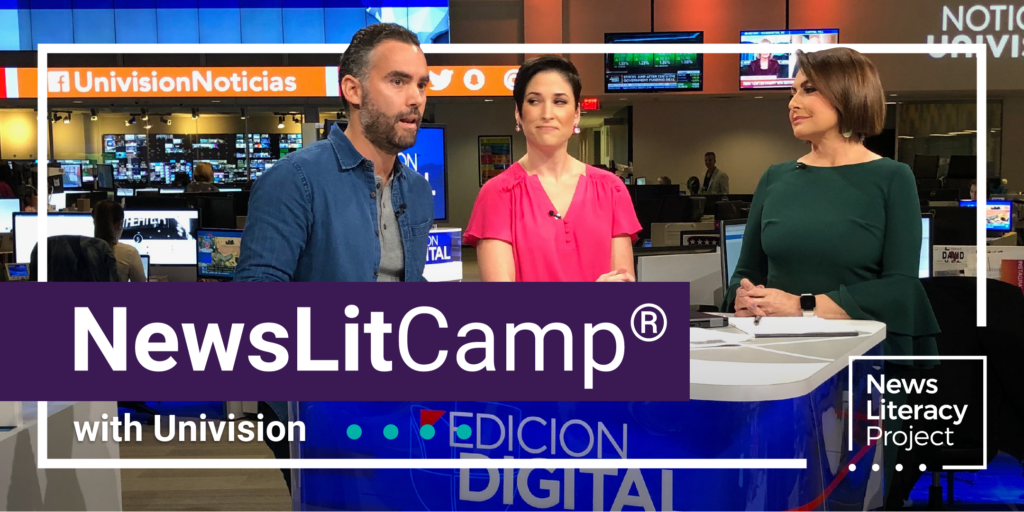
Details
Educators will meet at Univision for a full day of free workshops and conversations with NLP staff and Univision News reporters and editors. Breakfast and lunch will be provided.
About NewsLitCamp
NewsLitCamp is a day-long professional development workshop primarily for middle school and high school educators. Using an “edcamp”-style of continuing education, it features topical sessions (developed with input from attending teachers) in the morning and open-ended, educator-driven planning and development time in the afternoon. This format gives education professionals an opportunity to come together in the engaging, fast-paced environment of a news organization for a day of news literacy training and conversations with journalists and NLP‘s in-house experts.
Why attend?
NLP created NewsLitCamps to help educators improve their own news literacy skills, introduce them to resources for teaching news literacy and get their ideas and input for new resources. Participants will leave with new ideas, skills and resources to help their students navigate today’s complex information landscape and beat back a rising tide of misinformation. We also want to encourage a greater understanding between journalists and educators that enhances the appreciation of the vital civic role each has in our democracy.
Who can attend
NewsLitCamps are designed primarily for middle school and high school teachers and librarians. Space permitting, we welcome other educators and school administrators. Miami-Dade County Public School educators will receive continuing education credits for their participation (see the course titled “News Literacy” in “My Learning Plan” on the M-DCPS portal).
Bonus: Attendees will learn about NLP’s Checkology® virtual classroom, a cutting-edge comprehensive e-learning platform that complements educators’ lesson plans.
Its 13 lessons examine a variety of topics related to news literacy, including:
- The standards of quality journalism and their use in determining the credibility of information.
- Digital forensics and the varied types of misinformation.
- Watchdog journalism and its contributions to democracy.
- Press freedoms around the world.
- The evaluation of bias in news and other information.
- The importance of using accurate and truthful evidence when making arguments.
About Univision Communications Inc.
Univision is the leading media company serving Hispanic America. The company’s broadcast assets include Univision Network, one of the top television networks in the U.S. regardless of language and the most-watched Spanish-language broadcast network in the country; Univision Local Media, which owns and/or operates 64 television stations and 58 radio stations in major U.S. Hispanic markets and Puerto Rico; and Univision.com, the most-visited Spanish-language website among U.S. Hispanics. The award-winning news division of Univision Communications Inc. is committed to informing the country’s fastest-growing segment across all media platforms. Hispanics count on the latest and most relevant content that impacts the community through Noticiero Univision, the network’s evening, late evening and weekend national newscast; the Sunday public affairs program Al Punto (To The Point); newsmagazine shows Aquí y Ahora (Here and Now) and Primer Impacto (First Impact); as well as morning news segments on Despierta América (Wake Up America). Univision News has strengthened its news team and expanded its operations by adding investigative, documentary, infographics and data journalism units.
Charlotte educators: NewsLitCamp® with The Charlotte Observer
Join the News Literacy Project (NLP), The Charlotte Observer and Charlotte-Mecklenburg Public Schools for a highly engaging, teacher-centered NewsLitCamp featuring breakout sessions with Charlotte Observer journalists.
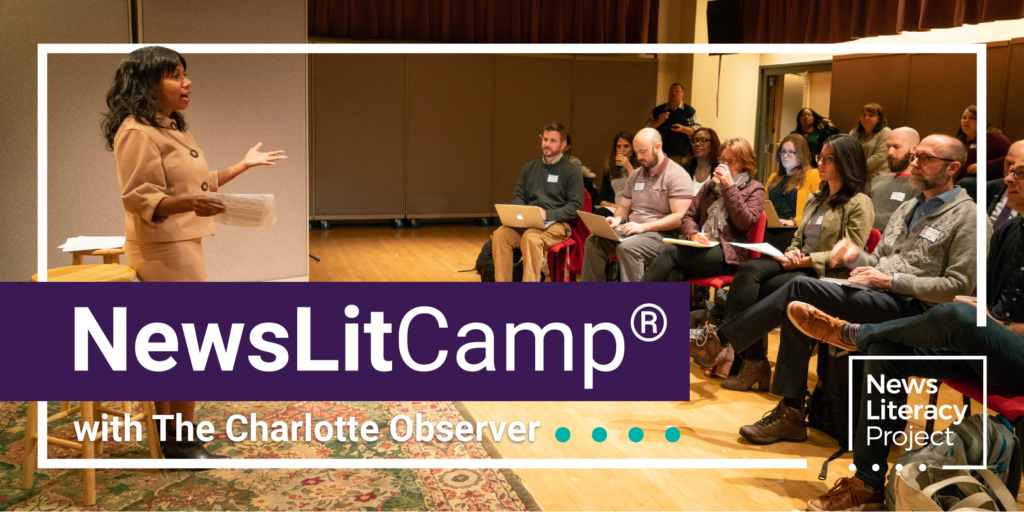
Details
Educators will meet at The Charlotte Observer for a full day of free workshops, conversations and maker sessions with NLP staff and Observer reporters and editors. Breakfast and lunch will be provided.
About NewsLitCamp
NewsLitCamp is a day-long professional development workshop primarily for middle school and high school educators. Using a hybridized approach to “edcamp”-style continuing education, it features topical sessions (developed with input from attending teachers) in the morning and open-ended, educator-driven planning and development time in the afternoon. This format gives education professionals an opportunity to come together in the engaging, fast-paced environment of a news organization for a day of news literacy training and conversations with journalists and NLP staff.
Why attend?
NLP created NewsLitCamps to help educators improve their own news literacy skills, introduce them to resources for teaching news literacy, and get their ideas and input for new resources. Educators will leave with new ideas, skills and resources to help their students navigate today’s complex information landscape and beat back a rising tide of misinformation. We also want to encourage a greater understanding between journalists and teachers — including an appreciation of the realities that both face in playing a vital civic role with increasingly scarce resources.
Who can attend
NewsLitCamps are designed primarily for middle school and high school teachers and librarians. Space permitting, we also welcome other educators and school administrators. Charlotte-Mecklenburg Schools educators will receive one full continuing education unit credit for their participation (details provided after registration).
Bonus: Participants will learn about NLP’s Checkology® virtual classroom, a comprehensive news literacy e-learning hub that complements educators’ lesson plans.
Lesson topics include:
- The standards of quality journalism and their use in determining the credibility of information.
- Digital forensics and the varied types of misinformation.
- Watchdog journalism and its contributions to democracy.
- Press freedoms around the world.
- The evaluation of bias in news and other information.
- The importance of using accurate and truthful evidence when making arguments.
- The role of personalization algorithms in the creation of filter bubbles.
About The Charlotte Observer
Since 1886, The Charlotte Observer has been dedicated to serving Charlotte and its surrounding region with strong, independent journalism and a mission to report clearly, truthfully and completely. The Observer is the largest-circulating newspaper in North Carolina and the most visited news and information website in the Carolinas. Its staff has won four Pulitzer Prizes, including two Gold Medals for Public Service. #Readlocal
Educators in Chicago or attending #NCSS18: NewsLitCamp® at WBEZ
Join the News Literacy Project (NLP), WBEZ and the National Council for the Social Studies (NCSS) for a NewsLitCamp on Thursday, Nov. 29, from 8 a.m. to 3 p.m.
WBEZ (91.5 FM) is Chicago’s NPR affiliate; it also produces This American Life and co-produces, with NPR, the popular current affairs quiz show Wait Wait … Don’t Tell Me! NCSS is a professional association that provides leadership, service and support to social studies educators; its annual conference, in Chicago, begins Nov. 30.
NewsLitCamp is a hybridized approach to “edcamp”-style professional development, with topical sessions (developed with input from teachers) in the morning and an open-ended, teacher-suggested workshop schedule in the afternoon. For this NewsLitCamp, offered as an NCSS pre-conference clinic, educators will meet at WBEZ for a full day of workshops, conversations and maker sessions with NLP staff, NLP ambassador educators and WBEZ reporters and editors.
This NewsLitCamp is open to both educators attending NCSS and Chicago-area educators. Registration is free; space is limited. Breakfast and lunch will be provided.
Why should educators attend? NLP created NewsLitCamps to help middle school and high school educators improve their own news literacy skills, introduce them to resources for teaching news literacy and get their ideas and input for new resources. We also want to encourage a greater understanding between journalists and teachers — including an appreciation of the realities each face in playing a vital civic role on the front lines of the country’s democracy.
Bonus: Participants will learn about NLP’s Checkology® virtual classroom, a comprehensive news literacy e-learning hub that complements educators’ lesson plans. Lesson topics include:
- The standards of quality journalism and their use in determining the credibility of information.
- The history of watchdog journalism and its contributions to democracy.
- The evaluation of bias in news and other information.
- The differences in press freedoms around the world.
- The importance of using fact-based evidence when making arguments.
- The role of personalization algorithms in the creation of filter bubbles.
Questions? Email Peter Adams, NLP’s senior vice president of education, at [email protected].
American Public Health Association annual meeting
NLP has long described the misinformation and disinformation epidemic as “a public health crisis.” Now it’s a topic of discussion at the American Public Health Association’s annual meeting. Alan C. Miller, our founder and CEO, will be joined by experts from the RAND Corporation and the Center for Media Literacy to discuss “Facts Matter: Truth, Media and Public Health.”
News literacy sessions in Brazil
Christine Nyirjesy Bragale, NLP’s senior vice president of communications, is taking the news literacy message to Brazil this week. Between Nov. 6 and Nov. 13 she will be leading discussions on media literacy and information disorder, open to the public, in Manaus, Brasília and Sāo Paulo; she will also meet with students, educators and journalists.
Bragale’s visit is sponsored by the U.S. Embassy and several Brazilian educational institutions and news outlets.
National Association of Science Writers — 2018 meeting
These days, communicating with young people about science is critical — especially when the phrase “fake news” is often applied to scientific topics. Today’s tweens and teens are the next generation of voters; some could be casting their first ballots as soon as next month. To make good decisions, they will need both science literacy and media literacy — the ability to judge a report’s credibility and authenticity.
NLP’s director of partnerships, Damaso Reyes, is joining science writers and editors at ScienceWriters2018 — the annual meeting of the National Association of Science Writers — for a panel on Saturday, Oct. 13, titled “Talking with young people about science in the age of #fakenews.” Panelists will share insights and experience from diverse areas that include news literacy training, public engagement and outreach, and science journalism for middle school and high school students.
L.A. area educators: NewsLitCamp® at UCLA
Join the News Literacy Project and the Los Angeles Times for a highly engaging (and free!) teacher-centered NewsLitCamp — a professional development event featuring breakout sessions with L.A. Times journalists.
The Los Angeles Times has been covering the city, the region and the world for more than 136 years. It has won 44 Pulitzer Prizes in a variety of categories (24 in the last 20 years alone), including six gold medals for public service — the most recent in 2011 for its reports on corruption in the city of Bell.
NewsLitCamp is a hybridized approach to “edcamp”-style professional development, with topical sessions (developed with input from teachers) in the morning and an open-ended, teacher-suggested workshop schedule in the afternoon. For this NewsLitCamp, middle school and high school educators will meet at UCLA for news literacy training and conversations with NLP staff and Los Angeles Times journalists.
Register (it’s free!) here. Space is limited.
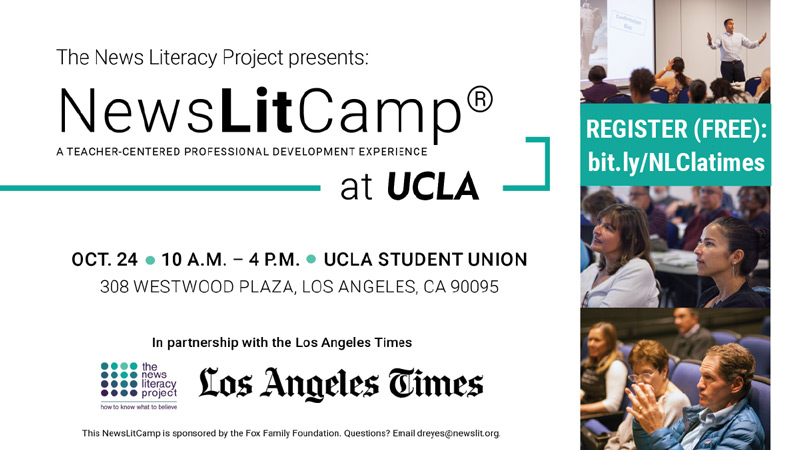
Why should I attend? NLP created NewsLitCamps to help educators improve their own news literacy skills, introduce them to resources for teaching news literacy and get their ideas and input for new resources. We also want to encourage a greater understanding between journalists and teachers — including an appreciation of the realities each face in playing a vital civic role on the front lines of the country’s democracy.
LAUSD educators will receive professional development credits.
Bonus: Participants will learn about NLP’s Checkology® virtual classroom, a comprehensive news literacy e-learning hub that complements educators’ lesson plans. The platform includes lessons on:
- The standards of quality journalism and their use in determining the credibility of information.
- The history of watchdog journalism and its contributions to democracy.
- The evaluation of bias in news and other information.
- The differences in press freedoms around the world.
- The importance of using fact-based evidence when making arguments.
- The role of personalization algorithms in the creation of filter bubbles.
This NewsLitCamp is presented by the News Literacy Project and UCLA and is sponsored by the Fox Foundation.
Questions? Email Damaso Reyes, NLP’s director of partnerships, at [email protected].
Houston area educators: NewsLitCamp® at the Chronicle
Join the News Literacy Project, the Houston Chronicle and the Houston Independent School District (HISD) on Friday, Nov. 9, for a highly engaging (and free!) teacher-centered NewsLitCamp — a professional development event featuring breakout sessions with Chronicle journalists.
The Houston Chronicle, founded in 1901, is one of the largest newspapers in the United States. It was a Pulitzer Prize finalist in the public service and editorial writing categories in 2017 and in the breaking news category (for Hurricane Harvey coverage) in 2018; columnist Lisa Falkenberg won the Pulitzer Prize for Commentary in 2015.
NewsLitCamp is a hybridized approach to “edcamp”-style professional development, with topical sessions (developed with input from teachers) in the morning and an open-ended, teacher-suggested workshop schedule in the afternoon. For this NewsLitCamp, middle school and high school educators will meet at the Houston Chronicle for news literacy training and conversations with NLP staff and journalists from the Chronicle.
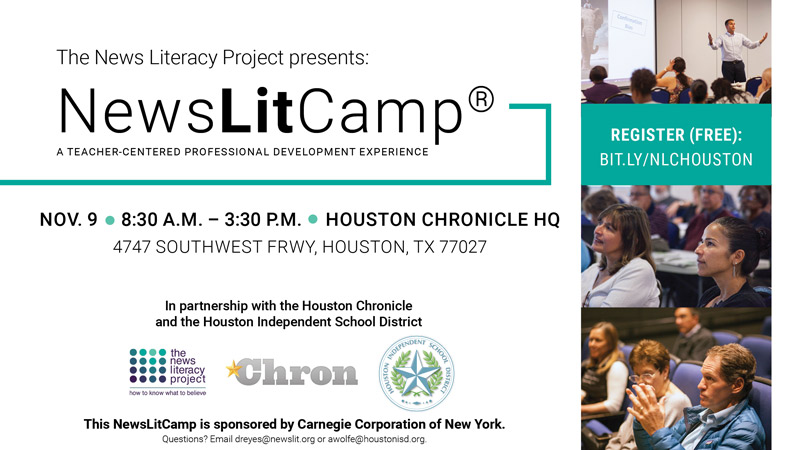
Register (it’s free!) here. Space is limited.
Why should educators attend? NLP created NewsLitCamps to help educators improve their own news literacy skills, introduce them to resources for teaching news literacy and get their ideas and input for new resources. We also want to encourage a greater understanding between journalists and teachers — including an appreciation of the realities each face in playing a vital civic role on the front lines of the country’s democracy.
Bonus: Participants will learn about NLP’s Checkology® virtual classroom, a comprehensive news literacy e-learning hub that complements educators’ lesson plans. Lesson topics include:
- The standards of quality journalism and their use in determining the credibility of information.
- The history of watchdog journalism and its contributions to democracy.
- The evaluation of bias in news and other information.
- The differences in press freedoms around the world.
- The importance of using fact-based evidence when making arguments.
- The role of personalization algorithms in the creation of filter bubbles.
This NewsLitCamp is sponsored by Carnegie Corporation of New York.
Questions? Email Damaso Reyes, NLP’s director of partnerships, at [email protected] or Annie Wolfe, HISD secondary curriculum and development officer, at [email protected].
Association for Middle Level Education – 2018 conference
John Silva, NBCT, our director of education, is presenting a session at the 2018 conference of the Association of Middle Level Education (AMLE), which describes itself as “the most valuable and comprehensive professional development opportunity in the world for any person working with students ages 10–15.”
John’s topic: “Creating a Classroom Where Facts Prevail and Students Become Critical Consumers of News and Information.” NLP will also have a booth at the conference, which runs from Oct. 25 to Oct. 27.
Educators: Sign up for our online professional development series
Is one of your goals as a teacher to help your students make sense of the torrent of news and other information streaming through their online worlds?
Would you like to empower your students by providing them with the news literacy skills they need to become active and engaged participants in civic life?
Our online professional development sessions are for you!
Teaching News Literacy is an affordable series of four online workshops that meet these needs. Led by Peter Adams, NLP’s senior vice president of education, and John Silva, a National Board Certified Teacher and NLP’s director of education, these workshops will give you everything you need to begin introducing news literacy into your classroom, including dozens of ideas, examples and tools to jump-start your news literacy instruction.
You can register for one, some or all of the sessions here ($10 per session/$30 for all four).
Session 1 – An introduction to news literacy education: This session makes the case for news literacy as a vital 21st-century skill and provides an overview of concepts and tools. We’ll put news literacy instruction in context and demonstrate how to integrate it into your classroom, using timely events and examples. We’ll also introduce important concepts and skills: how information gets filtered, how journalists decide if an event or issue is newsworthy, how the First Amendment and the watchdog role of the press play important roles in our democracy, how to evaluate bias in the news media, how to detect and debunk viral rumors, and how to analyze branded content. Tuesday, Aug. 28 (5 to 6 p.m. ET)
Session 2 – Exploring the misinformation landscape: Learn how to teach students about “fake news” and the many other forms of misleading, inaccurate and outright false information that they encounter every day. We’ll tackle the misinformation landscape: why it’s important to teach students about it, and how to use examples of misinformation to engage students in news literacy and civic learning. We’ll also discuss the authentic civic pathways and actions made available to students through studying misinformation; introduce the concept of “digital forensics” (skills and tools that can help students debunk manipulated and false images); and examine the ways that producers of misinformation are likely to exploit technological advances in the near future. Wednesday, Sept. 12 (5 to 6 p.m. ET)
Session 3 – Using news literacy to drive civic engagement: Consuming, engaging with, sharing and creating information are the most fundamental and common civic actions that anyone can take. This session will explore how news literacy learning can ignite civic engagement and improve civic literacy and reasoning. We’ll look at the connection between news literacy and civics by examining the vital role that information plays in the national conversation and discussing the opportunities for meaningful civic engagement that today’s information landscape offers. Finally, we’ll provide tips, ideas and strategies for using news literacy to supercharge a “consume/engage/create” cycle around timely civic issues. Thursday, Sept. 27 (5 to 6 p.m. ET)
Session 4 – Using digital forensics to drive news literacy learning: This session will primarily focus on applying key digital forensics skills to student activities and engaged learning. Tuesday, Oct. 9 (5 to 6 p.m. ET)
D.C. area educators: NewsLitCamp® at Bloomberg BNA
Join the News Literacy Project (NLP), Bloomberg BNA and Arlington (Virginia) Public Schools on Tuesday, Aug. 28, for a highly engaging, teacher-centered NewsLitCamp featuring breakout sessions with Bloomberg BNA journalists. This professional development event will be held at Bloomberg BNA’s headquarters in Crystal City (1801 S. Bell St., Arlington, VA 22202) from 9:30 a.m. to 3:30 p.m.
NLP empowers educators to provide students with the skills they need to become smart, active consumers of news and other information and engaged, informed participants in the civic life of their communities. Bloomberg BNA — an affiliate of Bloomberg LP, one of the world’s leading financial news organizations — provides news and analysis to legal, tax, compliance, government affairs and government contracting professionals.
Register (it’s free!) here. Space is limited.
About NewsLitCamp: NewsLitCamp is a hybridized approach to “edcamp”-style professional development, with topical sessions (developed with input from teachers) in the morning and an open-ended, teacher-suggested workshop schedule in the afternoon. For this NewsLitCamp, middle school and high school educators will come together at Bloomberg BNA in Arlington for news literacy training and conversations with NLP staff and journalists from Bloomberg BNA.
Why should I attend? NLP created NewsLitCamps to help educators improve their own news literacy skills, introduce them to resources for teaching news literacy and get their ideas and input for new resources. We also want to encourage a greater understanding between journalists and teachers — including an appreciation of the realities each face in playing a vital civic role on the front lines of the country’s democracy.
Bonus: Participants will learn about NLP’s Checkology® virtual classroom, a comprehensive news literacy e-learning hub that complements educators’ lesson plans. Lesson topics include:
- The standards of quality journalism and their use in determining the credibility of information.
- Watchdog journalism and its contributions to democracy.
- The evaluation of bias in news and information.
- The differences in press freedoms around the world.
- The importance of using accurate and truthful evidence when making arguments.
- The role of personalization algorithms in the creation of filter bubbles.
This NewsLitCamp is presented by the News Literacy Project and is sponsored by The Morris & Gwendolyn Cafritz Foundation and The Resilience Fund.
Questions? Email Damaso Reyes, NLP’s director of partnerships, at [email protected] or Cathy Bonneville Hix, social studies supervisor at Arlington Public Schools, at [email protected].
Kiwanis Capital District Convention
Kiwanis is holding its 100th Annual Capital District Convention on Aug. 17, 18 and 19 at the Hyatt Regency Reston in Reston, Virginia, and NLP will be there.
Damaso Reyes, NLP’s director of partnerships, will deliver the keynote address during the Fellowship Luncheon on Saturday, Aug. 18. His topic: “Fighting Fake News: How we can educate young people and defend democracy.” He also is leading a workshop on “Teaching News Literacy: New threats, new strategies, new tools” at 2 p.m. on Saturday.
The Kiwanis Club of Washington, D.C., has supported NLP’s work since 2014.
To learn more about the News Literacy Project, visit us at booth 1106. For more information, email Damaso at [email protected].
